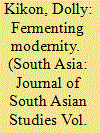|
|
|
Sort Order |
|
|
|
Items / Page
|
|
|
|
|
|
|
| Srl | Item |
| 1 |
ID:
157089


|
|
|
|
|
| Summary/Abstract |
In Nagaland, state attempts to control coal mining are framed as efforts to stop practices labelled ‘unscientific’ by the government. In this article we explore the ways in which communities create their own mining infrastructure built on networks of relations—materialised in English-language documents—and everyday technology—demonstrated in the prevalence of old trucks and improvised machinery. These objects enable livelihoods and supplementary incomes in this region. At the same time, they are also ways of challenging state attempts to control natural resources and for tribal communities to make claims on territory. We focus on coal mining infrastructure, technology and territorial claims in a frontier described variously as remote, inaccessible and underdeveloped, and explore the ways in which practices considered ‘unscientific’ endure and undergird an alternative system of community natural resource management and exploitation.
|
|
|
|
|
|
|
|
|
|
|
|
|
|
|
|
| 2 |
ID:
139471


|
|
|
|
|
| Summary/Abstract |
In this article, I explore notions of modernity, citizenship, belonging and transgressions in South Asia through the fermented food, akhuni. Fermented soya beans, popularly known as akhuni in Nagaland, a state in Northeast India with a majority tribal population, has a distinct pungent aroma and taste. This food is relished across the eastern Himalayan societies, including Nagaland, but routinely causes conflict between akhuni consumers and those who find the smell revolting. In 2007, due to increasing akhuni conflict in New Delhi, the Delhi police produced a handbook t hat cautions students and workers from Northeast India and eastern Himalayan societies that they should refrain from cooking akhuni and other fermented foods. Such official directives reiterate how the state plays a significant role in legitimising or prohibiting certain foods that particular social groups in contemporary India consume, relegating these communities to a remote position in the national social and culinary order. Against the backdrop of such friction, this article examines why akhuni consumers of the eastern Himalayan societies assert that eating fermented food is an integral part of their culture and history. Conversations about eating cultures, I argue, have to be understood as expressions of resistance, negotiation and the anxieties of striving to be a modern tribal in contemporary India.
|
|
|
|
|
|
|
|
|
|
|
|
|
|
|
|
| 3 |
ID:
090567


|
|
|
|
|
| Publication |
2009.
|
| Summary/Abstract |
Militarisation and structural violence under the Armed Forces Specials Powers Act (AFSPA) is tied to a strong moral framework to proselytise recalcitrant citizens. Deploying Jacque Derrida's point that law is not justice, this paper highlights how the pursuit of justice within the framework of law is a challenging task. Interrogating the contentions around what constitutes 'justice' under the AFSPA, this paper exposes how states legitimise lawlessness through draconian laws like the AFSPA. In this manner, lawlessness is established as a precedent for states to reproduce forms of lawless regimes and undemocratic mechanisms. This paper proposes that along with the campaigns to repeal the AFSPA, we need to reflect upon what kind of justice we seek. Repressive and discriminatory regimes of law, government or practice survive even after they have been formally dismantled. Here, both the state and its citizens negotiate reality regarding the limits of justice in their own way. For the Indian state, it has had to constantly over-extend its coercive powers in order to control the situation. While for its citizens who live under the AFSPA, such a reality is not only a matter of concern but it also redefines their position as citizens/subjects, to the extent that they question the very foundations of democracy,
|
|
|
|
|
|
|
|
|
|
|
|
|
|
|
|
| 4 |
ID:
096927


|
|
|
| 5 |
ID:
154548


|
|
|
|
|
| Summary/Abstract |
In the last decade, large numbers of indigenous youth from the uplands of Northeast India have migrated to metropolitan cities across the country. Many end up in the new service sector, getting jobs in high-end restaurants, shopping malls and spas. The demand for their labour is due to their un-Indian ‘exotic Asian’ appearance and a reputation for being hardworking and loyal. Such labour market value is a remarkable reversal of their position considering the earlier colonial stereotypes of their savagery and disobedience, reproduced through the de-politicisation of their armed insurrections during the post-colonial period. This paper addresses their daily experiences of vulnerability and marginality as well as the freedom and aspirations that a migratory life seem to engender.
|
|
|
|
|
|
|
|
|
|
|
|
|
|
|
|
|
|
|
|
|